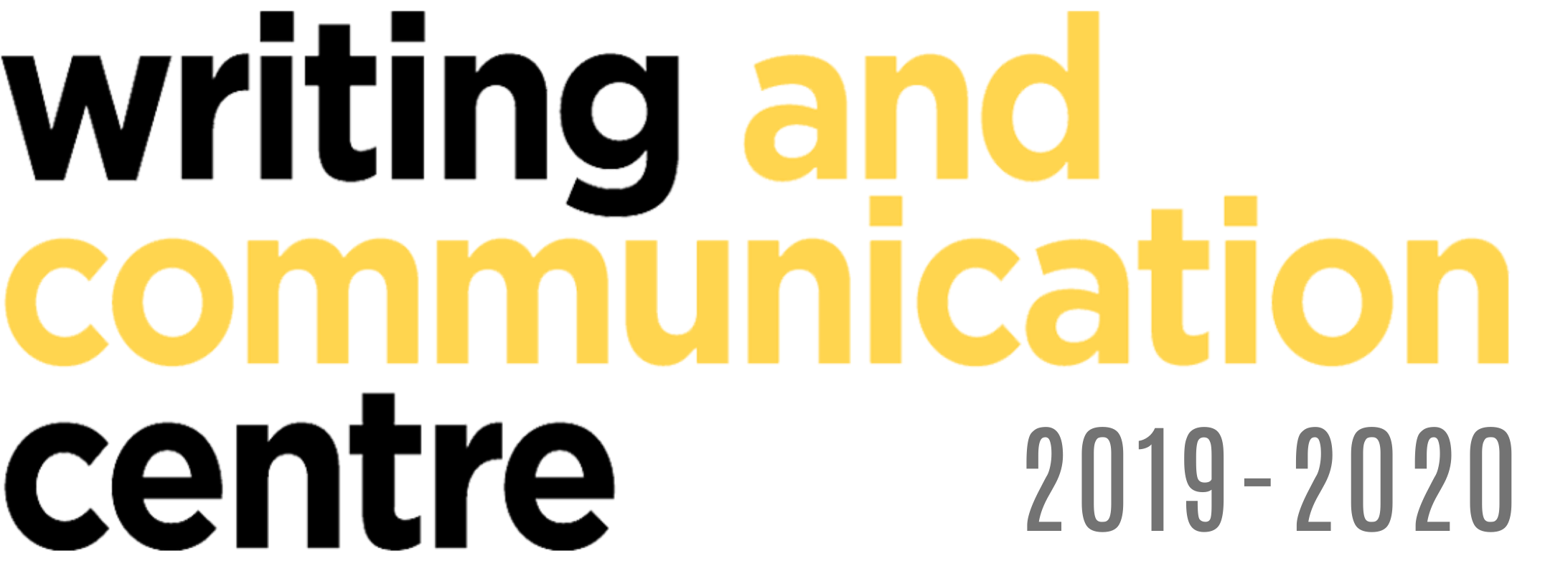
Annual Report
Guiding Principles
Our Vision
As a hub of research and expertise, the Writing and Communication Centre will foster excellence in written, spoken, and visual communication within the University of Waterloo community.
Our Mission
The Writing and Communication Centre engages, encourages, and empowers members of the University of Waterloo community to communicate more effectively while meeting the varied expectations of their disciplines and vocations.
To achieve our mission, we deliver timely and focused individualized teaching at all stages of the composition and communication design processes.
We help students, staff, and faculty:
- Synthesize, integrate, and share best practices in communication
- Experience their work as others do
- Support and promote a lively, cross-disciplinary writing culture on campus and online
- Develop skills and strategies that last a lifetime
Every experience I’ve had with them has been motivational and has helped me with my skill development. UW has a great staff and I am grateful to have been able to use them.
Message from the Director
The end of the 2019/2020 academic year was overshadowed by the pandemic and the sudden shift to virtual learning that interrupted the end of the winter term. Looking backwards, it’s almost surreal to remember the normalcy of our academic lives in the spring and fall of 2019 and even the early winter of 2020. But writing this report from my desk at home, it is wonderful to be reminded of the diverse activities of the Writing and Communication Centre (WCC) team throughout the past year as we have supported undergraduate students, graduate students, postdoctoral fellows, and faculty. I’m proud to share our growth and successes here in our first public annual report.
Collaboration with instructors, librarians, and academic support staff is critical to the work of the WCC, which overlaps a wide range of learning and research activities. One of our strongest areas of growth over the last few years is our Course-Integrated Support (CIS), a range of collaborative teaching activities developed in conjunction with instructors, academic programs, lab groups, research groups, and program-based student associations. Because the number of partnerships under this program is increasing each year, one staff role now provides dedicated support to managing and facilitating this program, with participation from other staff as needed. In 2019-2020, we facilitated over 200 workshops and teaching activities, which represent a 22% increase over the previous year. Many of these sessions are delivered to undergraduate students in first-year courses, and we hope they encourage students to draw on the support of the WCC throughout their undergraduate careers.
The expansion of the WCC’s general peer tutor program is a highlight from this past year. A team of graduate and undergraduate students engage in intensive training and ongoing professional development to enable them to respond to a wide range of writing assignments across disciplines, and to employ diverse coaching and teaching strategies with students. A strong peer tutor team allows the WCC to be more flexible and responsive to the University community’s needs, and it provides an enriching part-time work experience for undergraduate and graduate students. Many unique initiatives, such as our Instagram Live Q&As and our YouTube Live writing café, have emerged from this creative group of students. As well, our graduate program partnerships, such as 3MT and GradFlix coaching, have been enriched by one-on-one tutoring from our graduate peer tutors.
Our graduate programming was reviewed and fine-tuned for 2019-2020, and it continues to represent a key investment of WCC resources and staff time. In addition to individual appointments, which graduate students tell us are essential to their productivity and progress, programs like Dissertation Boot Camp and Speak Like a Scholar blend theory and practice to create high-impact learning and development experiences. Last year, we changed Thesis Fundamentals from a one-day program into three half-day workshops called Rock Your Thesis 1, 2, and 3. The new workshops line up with specific stages of students’ thesis writing, which makes each one a more relevant and useful experience. We are also proud to work with campus partners, including GSPA, CCA and CTE, to create engaging professional development experiences for graduate students and help prepare them for the next phase of their careers.
Over the last year, we have made significant progress on our Strategic Plan goals, from a staff re-structuring process to ensuring that students can get more timely access to appointments. Indeed, sharing our progress through this annual report represents follow-through on our commitment to improve our assessment measures and reporting. It is an opportunity for us to share our progress and be transparent and accountable to the University community.
Finally, suddenly finding ourselves in a remote and virtual landscape presented some key challenges at the end of the 2020 academic year. Our team rose to the challenge and, by working together and with campus partners, we successfully created new ways of connecting with students and provided opportunities for community connection in a range of writing groups and online programs. This new reality of remote online learning, which seemed temporary in March, will continue for the foreseeable future. I’m confident that the WCC will continue to adapt with creativity and dedication to support the scholarly and professional communication needs of the University of Waterloo Community.
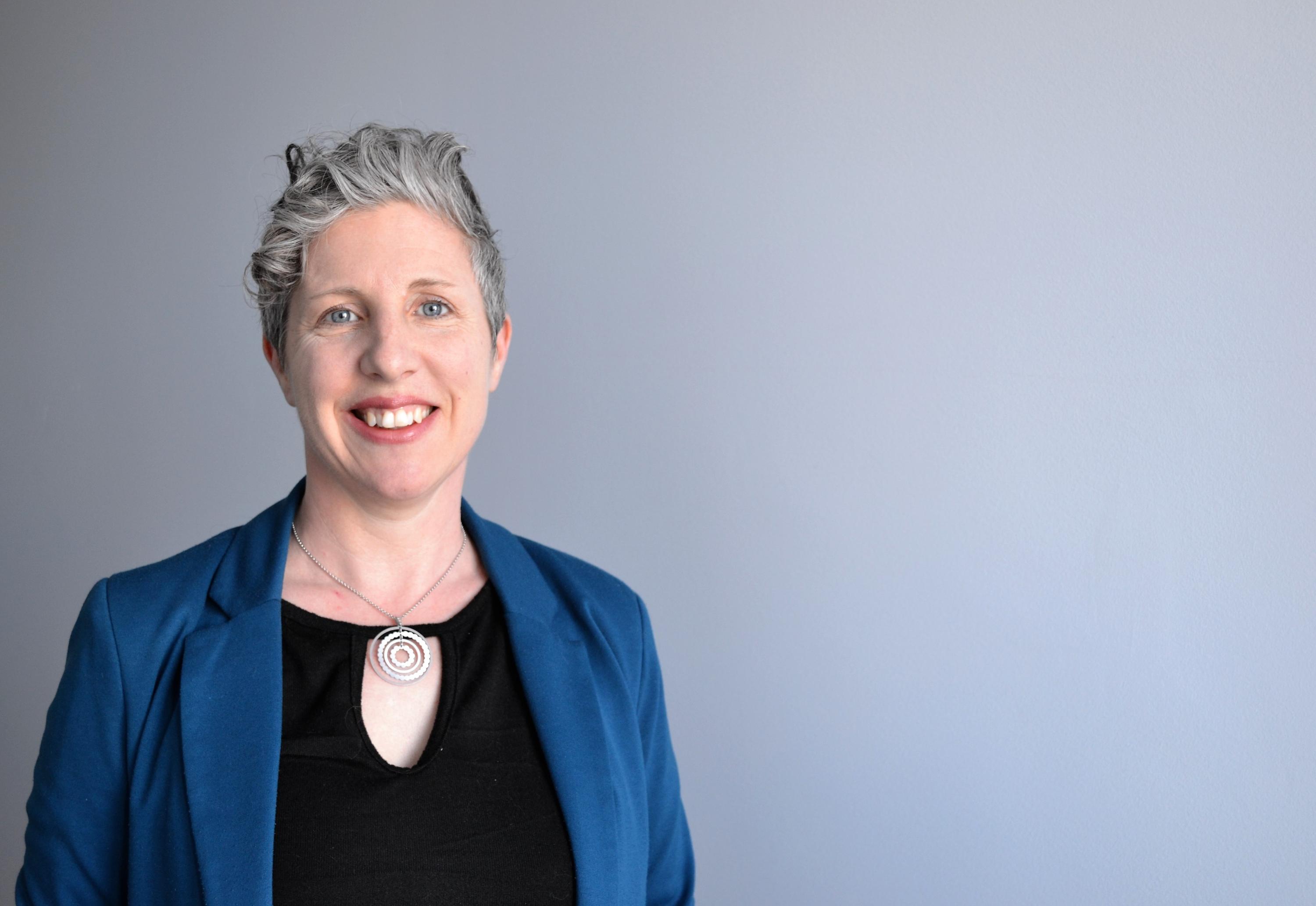
Dr. Clare Bermingham
Director, Writing and Communication Centre
Graduate Programming in 2019-2020
2019-2020 was a busy and exciting year for services for graduate students, postdoctoral fellows, and faculty writers at the Writing and Communication Centre. Here are a few highlights:
Appointments
As shown in comments throughout this report, individual consultations with Writing and Multimodal Communication Specialists continued to be one of the most in-demand and highly valued services the WCC offers for advanced researchers.
Dissertation Boot Camp
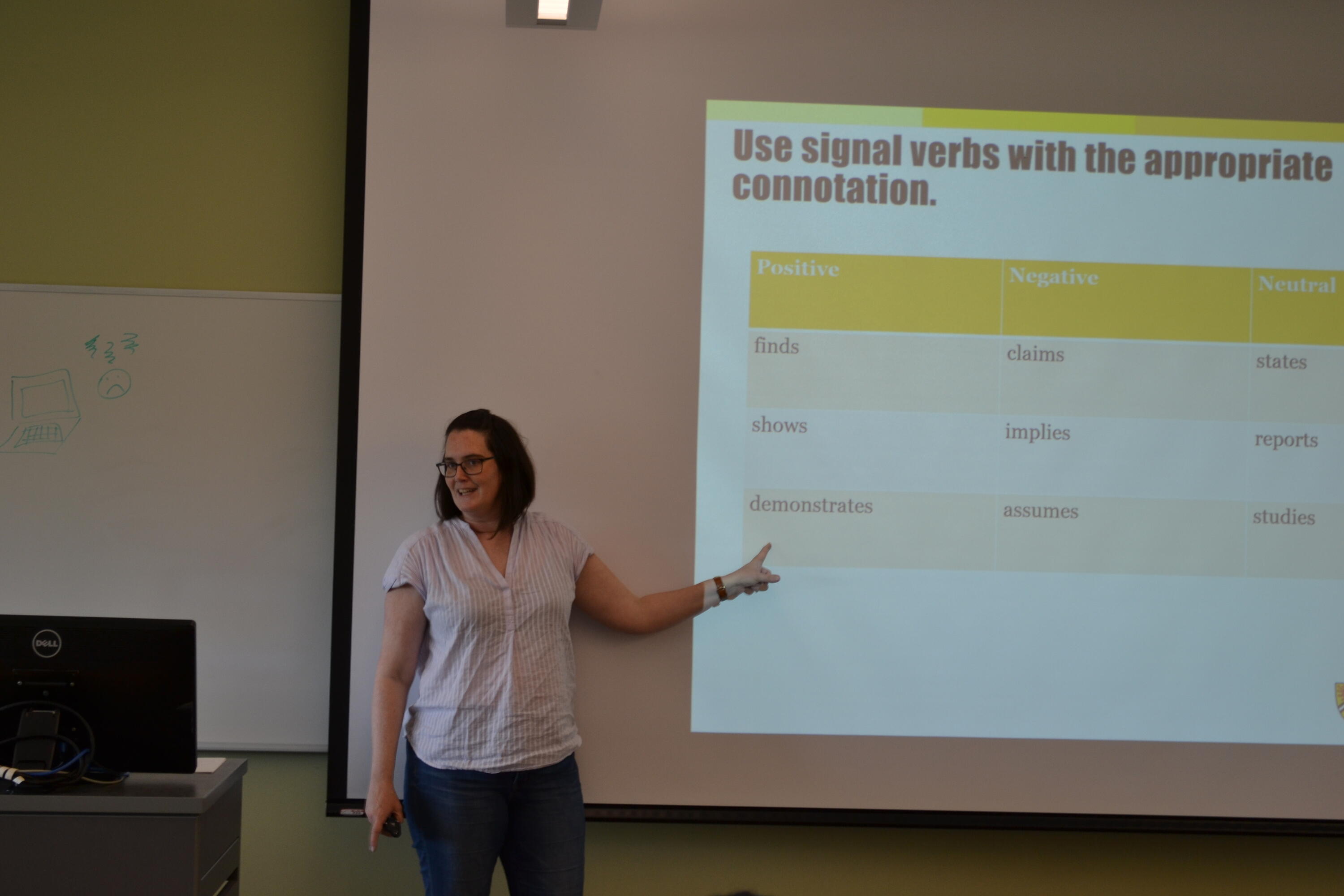
Our Dissertation Boot Camp (DBC) program continued to be popular and has evolved into a comprehensive suite of offerings. We hosted four DBCs in 2019-2020. Our intensive four-day program in summer 2019 and intensive online program in fall 2019 both ran as planned. Our sustained, eight-week in-person program in winter 2020 transformed into our first ever online, sustained DBC just over half-way through the program as a result of COVID-19. We had planned to offer our first ever hybrid DBC (with simultaneous in-person and online options) in April 2020, but instead offered a fully online DBC as social distancing measures continued. Participants in all versions of DBC highlighted individual consultations, working within a community and being motivated by their peers, setting aside time for writing, learning to be intentional about how to approach the writing process as highlights of the DBC experience.
In March 2020 the WCC’s LITE grant-funded research article – “Evaluating the Effectiveness of Dissertation Boot Camp Delivery Models” – which was nominated for the International Writing Centres Association’s Outstanding Article Award, was published.
I was provided targeted feedback that allowed me to polish a piece of writing for a scholarship submission, which I was able to secure!
Writing Communities
2018-2019 was the pilot year for #WaterlooWrites: a series of decentralized, volunteer-hosted, discipline-specific writing communities across campus. 2019-2020 saw the return of #WaterlooWrites groups. Writing group participants fill a “stamp card” by participating in writing sessions to earn incentives. In winter 2020 we revitalized the WCC-hosted grad writing cafés by including them in the “stamp card” system, and by assigning a graduate student host to these sessions. Both writing community programs ended abruptly in March 2020 because of COVID-19, but they re-emerged as Virtual Writing Cafés for graduate students, postdocs, and faculty in April 2020.
Speak like a Scholar
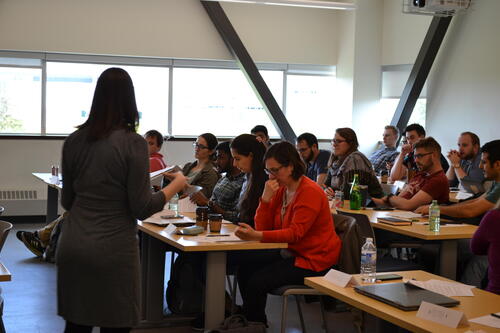
Our four-day presentation skills ‘boot camp,’ which was initially designed to help prepare students for their doctoral defense, continued to be highly regarded by doctoral participants. The WCC offered three Speak like a Scholar sessions in 2019-2020: In July 2019, October 2019, and February 2020. Participants consistently found value in the program’s workshops about slide design, mental skills training to deal with nerves and stage fright, and the many opportunities for hands-on presentation practice.
Rock Your Thesis
“Fundamentals for Writing your Thesis” transformed into “Rock Your Thesis” this year. This program, which was designed to complement DBC with workshops about the structural and technical choices involved in writing a thesis, received a new name and a new structure. It moved from a full-day workshop to three half-day workshops. This shift makes it possible for students to attend the workshop that is most relevant to them, with each workshop targeting a specific stage of the thesis process.
Campus Partners
The WCC continued to collaborate with campus partners such as Graduate Studies and Postdoctoral Affairs and the Centre for Career Action to support events for graduate students and postdocs. These events included the Three-Minute Thesis, GRADTalks, and GRADflix competitions, grad orientation and re-orientation events, Postdoc Appreciation Week, and both the Academic and Non-Academic Career Conferences. In a new partnership with Human Rights, Equity, and Inclusion and The Office of Research, the WCC helped to host an off-site faculty writing retreat for the first time in Paris, Ontario in fall 2019.
I improved my doctoral dissertation, my two articles for an international conference, my preparation for an exam, and my knowledge about the Canadian way of speaking.
Peer Tutor Programs and Arts First Programming in 2019-2020
Drop-In Peer Tutors
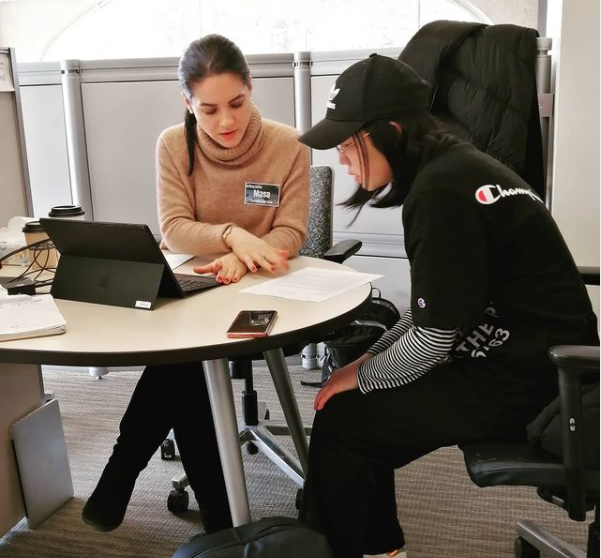
Our team of undergraduate and graduate drop-in peer tutors from a range of faculties supports students with any kind of communication assignment at any stage of the writing process. Peer tutors are available in person at Dana Porter and Davis Centre libraries when campus is open or online when services are virtual. By providing peer support, the WCC follows the evidence-based tradition of writing centres making space for students to learn from each other about writing and communication. Along the way, we are investing in our tutors as students by developing their writing and communication knowledge and their tutoring abilities.
In September 2019, the team expanded to ten peer tutors under the coordination of Stephanie White, our newly appointed Writing and Multimodal Communication Specialist, Peer Tutor Programs. With a dedicated coordinator and a larger team, we were able to make a number of changes to our internal programming. The most significant were:
- We established a Lead Peer Tutor role so that an experienced senior tutor could assist our coordinator with planning and facilitation of our programs.
- We expanded and formalized our professional development programming and resource bank to enhance ongoing training throughout the term, establish regular feedback opportunities from the coordinator and Lead Peer Tutor, and increase opportunities for tutor-tutor interactions.
- We refined our scheduling and protocols to streamline tutors’ set-up and take-down for shifts and build in additional tutor-tutor collaborations.
These modifications left us well poised to meet the increased demand for drop-in sessions we saw in the fall and early winter terms. Additionally, peer tutors reported a stronger sense of community as a team and came to rely on each other for support and advice as tutors. This sense of community has also led to excellent tutor retention, with peer tutors returning to work with us each term they are eligible, including after co-op and research terms or upon graduating and then entering new academic programs at UWaterloo.
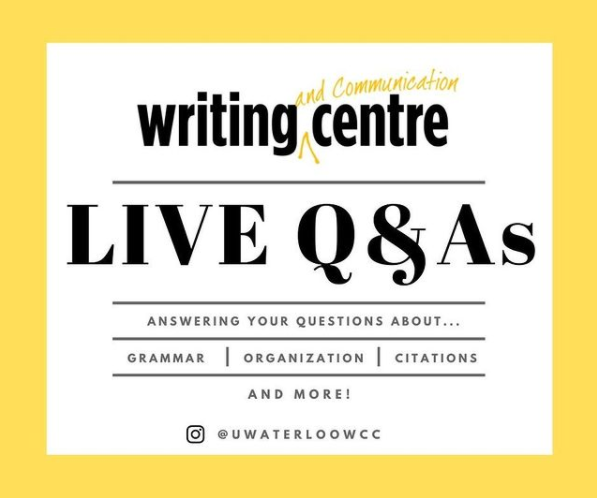
An additional update to our regular programming in winter 2020 was the establishment of a new partnership with the department of Athletics and Recreation to provide student athletes with direct access to trained writing and communication peer tutors. Two WCC tutors held 16 sessions with 9 different student athletes in the winter term, and we are pleased to continue with this program in the coming year.
In March 2020, we quickly moved all of our programming online and established new ways to meet students’ needs. First, recognizing that students were sleeping later and working later, we shifted to evening drop-in times. While we didn’t see much uptake from students, we were glad to see some of our regular students online, and we were grateful that we could keep our peer tutors employed through the end of the term. We also added weekly Live Q&A sessions on Instagram, Live PJ-Friendly Write-Ins on YouTube, and a WCC Subreddit to try to meet students wherever they were—physically and emotionally—amidst the pandemic.
It was easy to get assistance for an essay I was writing, even when I needed it last minute (drop-in sessions).
Arts First Program
Launched in fall 2019, the WCC Arts First program consists of embedded peer tutors and customized in-class workshops that support first-year communication courses in the Faculty of Arts: Arts 102, Arts 103, Arts 130, and Arts 140. This important partnership directly supports Goal 3 of the WCC’s strategic plan by strategically supporting undergraduate student needs through targeted programs.
Arts First Peer Tutors
Starting in September 2019, Arts First course instructors were given the opportunity to have a tutor assigned to their course(s). Following evidence-based embedded peer tutoring practices, our team of twelve advanced undergraduate Arts students facilitated one-to-one and group peer tutoring sessions and in-class activities, collaborating with course instructors to gain insight into course objectives, assignment goals, and assignment deadlines. In Fall 2019, we partnered with 22 instructors to provide peer tutors to 28 sections of Arts 130 and Arts 140. In Winter 2020, we partnered with 17 instructors to provide peer tutors to 24 sections of Arts 130, Arts 140, and Arts 103. In the fall and winter terms, Arts First peer tutors worked with over 260 students for a total of over 150 hours of tutoring. Many students also had multiple sessions with their peer tutor. A graduate-student Arts First Coordinator, Peer Tutors, assisted by our Writing and Multimodal Communication Specialist, Peer Tutor Programs, trained, scheduled, and mentored our team of tutors.
Through feedback survey and informal conversations, both instructors and students told us that the peer tutor program was useful to them. Students said they found their peer tutor welcoming, encouraging, and knowledgeable; they said peer tutors asked good questions and made good suggestions. 75% of instructor respondents to our feedback survey said they found their peer tutor easy to communicate with, helpful to students, knowledgeable, available when needed, and a useful addition to the course. Instructors said that students felt “more comfortable approaching their peer” rather than their instructor with questions. Some instructors commented that students benefitted from a tutor who could support them with aspects of their work beyond Arts First; as one instructor put it, their tutor “was closer to their [the students’] experience and could speak to the challenges of first-year students in managing work flow and stress levels.” In addition to benefiting students and instructors, peer tutors tell us that they find this work interesting, challenging, and fun, and that they develop lasting relationships with the students they tutor. We are excited to see how this program can continue to provide Arts First instructor support, excellent tutoring to students, and community-building in the Arts faculty.
A number of students were able to meet with my tutor multiple times throughout the semester to get individual writing support from someone who wasn't grading them. I saw significant improvement in their writing.
Arts First Workshops
Over the 2019/2020 academic year, 70 workshops (60% of all first-year workshops) were delivered to Arts First courses, reaching a total of 1254 first year Arts students. We delivered 35 workshops for 19 unique instructors in Fall 2019 and 36 workshops for 12 unique instructors in Winter 2020, facilitating in-class workshops for Arts First courses on various topics like “Writing Process and Productive Writing Strategies,” “Critical Reading,” and “Peer Feedback.” Rather than hiring a team of graduate workshop facilitators as was done in 2018-19, we instead hired one advanced graduate student as our Arts First Coordinator, Workshops. They planned and facilitated Arts First workshops with the support of our fulltime staff as needed. The formal and informal feedback we received on this workshop program through surveys and conversations was unanimously positive. In response to surveys each term, 100% of instructors said the workshops were relevant, engaging, and useful for students and 100% said they would recommend the workshops to other Arts First instructors. One instructor said, “It is valuable to model that there are lots of places to get help with learning (including the WCC)—nothing beats meeting and engaging with a writing expert!” Instructor feedback indicates that the most valuable aspects of the workshops were the facilitator’s knowledge and the workshop activities. For example, one instructor commented, “The facilitator had a strong ability to intuit what was called for, based on the assignment and past [PowerPoints], and I was very satisfied with the expertise.” In addition, at least one instructor has seen their teaching capacity grow through this collaboration, as they tell us they have begun incorporating our workshop materials into their own teaching.
I had a great experience with my tutor, who was professional and kind. When she visited my class … she was attentive and helpful and did not need much direction to be useful to the students.
Course-Integrated Support in 2019-2020
The course-integrated support (CIS) program delivers workshops to undergraduate courses, graduate courses, and research groups across the university. Directly supporting Goal 1 of the WCC’s strategic plan, WCC staff members collaborate with faculty members and student leaders to develop individualized workshops that integrate discipline-specific examples to support students’ needs.
Impact of CIS Workshops
Through the CIS program, WCC staff members continue to develop strong relationships with faculty members and research groups at the University of Waterloo. The overall impact of WCC’s CIS program during the 2019/2020 academic year increased compared to 2018/2019 (Table 1). During the spring and fall terms, the WCC delivered more workshops and reached a greater number of participants compared to the previous year. This increase was most noticeable during the spring term when the number of workshops delivered doubled, and the number of participants reached tripled. The winter term, however, showed a slight decrease compared to the previous year, likely due to the COVID-19 pandemic and the resulting workshop cancellations that occurred in March and April.
|
Table 1. Comparison of CIS workshop impact between the 2018/2019 and 2019/2020 academic years |
||||||
|---|---|---|---|---|---|---|
|
Sessions |
Participants |
|||||
|
Term |
2018/2019 |
2019/2020 |
% Difference |
2018/2019 |
2019/2020 |
% Difference |
|
Spring 2019 |
17 |
30 |
76% |
363 |
1175 |
224% |
|
Fall 2019 |
71 |
95 |
34% |
2578 |
3335 |
29% |
|
Winter 2020 |
83 |
77 |
-7% |
2694 |
2340 |
-13% |
|
Total |
171 |
202 |
18% |
5635 |
6850 |
22% |
Demographics of CIS support
The WCC supports undergraduate and graduate courses across from all six faculties at the University of Waterloo (Figure 1). In the 2019/2020 academic year, almost two-thirds of the workshops were delivered to courses from the Arts faculty. However, of the 112 requests from Arts courses, 71 were for Arts First courses, making up 37% of the total workshops delivered. Non-Arts First courses from the Arts faculty made up 25% of the total workshops delivered. This collaboration is discussed in more detail below. Collectively, the remaining five faculties made up 28% of the CIS workshops. The Other category includes the BASE/iBASE programs, as well as an undergraduate student group consisting of multiple faculties.
When broken down by program level, over three quarters (81%) of the CIS workshops were delivered to undergraduate courses, 16% were delivered to graduate courses, and the remaining 2% (Other) were delivered to research groups and student groups, which consisted of both undergraduate and graduate students or the program levels were unknown.
For undergraduate courses, the majority of CIS workshops were delivered to first year courses (Figure 2). For first year courses, workshops for Arts First courses made up 45% of all undergraduate workshops, while workshops delivered to first year, non-Arts First courses made up 34% of all undergraduate workshops. Collectively, second, third, and fourth year courses made up 19% of the CIS workshops, while the remaining 2% of the CIS workshops were delivered to student groups.
User Feedback
The WCC conducted a user feedback survey based on services used during the Fall 2019 term. Overall, CIS workshops received a satisfaction score of 80% based on 10 responses. When broken down by level of study, undergraduate students (n = 7) provided a satisfaction rate of 86%, masters students (n = 2) provided a satisfaction rate of 50%, and doctoral students (n = 1) provided a satisfaction rate of 100%.
Looking forward to 2020/2021
While the CIS program is reaching an increasingly greater number of students, the majority of these students are first year undergraduate students and/or Arts students. There is an opportunity to continue growing the CIS program by targeting second, third, and fourth year undergraduate courses, as well as graduate courses from the other five faculties, further supporting Goals 1 and 3 of the WCC’s strategic plan. With the COVID-19 pandemic forcing the closure of campus in March 2020, the WCC adapted their services to be online only. WCC staff quickly pivoted the CIS workshop program to be delivered virtually, providing instructors with asynchronous or synchronous workshop options to support their students’ learning. Although the pandemic affected the number of workshops that were delivered in-person at the end of the 2019/2020 academic year, it provided the WCC with a unique opportunity to start working towards Goal 2 of the strategic plan: extending WCC’s services in an accessible online learning environment that students can access asynchronously. The WCC looks forward to expanding the CIS program virtually and supporting more University of Waterloo students wherever they are located.
The workshops that I attended were very well organized. I learned a lot from them. The people who taught the workshops did their best to make sure they were interactive.
Response to COVID-19
In January and February 2020, as reports about the pandemic from other countries demonstrated the severity of its impact, the WCC began thinking about how we would adapt if a lock-down happened in Ontario. Since we already offer the option for online appointments during regular operations, our appointment software accommodates virtual meetings and our staff are accustomed to facilitating them. When the University shifted to remote learning, we were prepared to quickly shift to a fully online model for appointments and some programs.
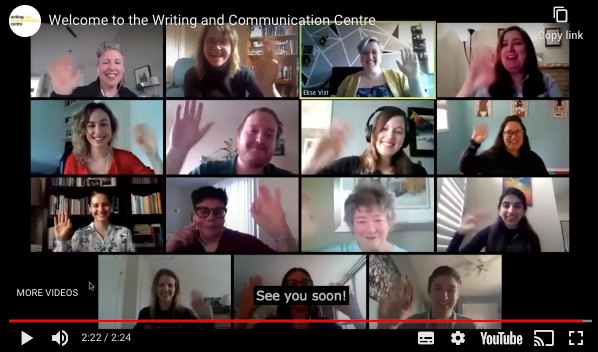
The one-week suspension of classes following the lock-down announcement gave us an opportunity to consider how to move forward with our other programs and services. Recognizing that students would be balancing school work with care for children and other family members, we offered drop-in appointments up to 9pm and shifted from a Monday to Friday schedule to a Sunday to Thursday schedule. During the end of winter term, we also explored using social media platforms to support students, for example with Instagram Live Q&As and YouTube Live Writing Groups, to ensure that students could find support in modes that were comfortable to them and easy to connect to.
At the start of the pandemic, most of us in the University were trying to figure out how to balance a myriad of work and home responsibilities. Making time to write, which is hard during normal times, became an even more intense challenge. Using LEARN’s classroom features, we moved our three weekly writing groups online for faculty and grad students to write together. Grad students who were in the middle of an in-person dissertation boot camp were quickly switched to our virtual version. Another dissertation boot camp ran virtually in April, as well.
Finally, the WCC recognized that faculty members might need writing support for their students in their classrooms more than ever. We made a plan to offer facilitation of asynchronous and synchronous in-class workshops during the spring term, and the team worked through April to plan a new virtual course-integrated support model using virtual workshops. Several regular workshops were also converted into virtual versions as we began to implement a plan for asynchronous workshop offerings in LEARN for all community members. Accessibility through universal design is one of our central concerns in virtual workshop design; the team ensured that all materials were readable by screen readers, that videos had open captioning, and that the community could access materials as multiple file types.
Ultimately, shifting operations as a result of COVID-19 has helped the Writing and Communication Centre reflect on how students access support for their writing and communication activities and what they value in their interactions with the WCC. Some students have suggested that the personal connection, through video, is meaningful. Others have indicated that they value being able to access support on their own schedule by connecting asynchronously to workshops. For us, this tells us that we need to continue to provide different pathways to and modes of writing and communication support to meet our community’s diverse needs.
They were still able to provide amazing services amidst the changes brought on by COVID-19 shutdowns. All the Writing Centre employees I interacted with were extremely helpful.
Strategic Plan Progress
The 2020-2021 academic year represents the mid-point of the Writing and Communication Centre’s 2023 Strategic Plan and an opportune time to pause and reflect on what we have achieved and what is still to come. In winter and spring 2021, the WCC will be assessing progress on our goals and their ongoing relevancy by re-connecting with campus stakeholders and analyzing program and assessment data.
In our strategic plan, the WCC articulated five management goals and five program goals. The following identifies where progress has been made on each goal and its associated outcomes.
Management Goals and Outcomes
Goal 1: Initiate a consultative staff review and restructuring process that will balance workloads, enable more productive partnerships with faculties, help with succession planning, and create room for undergraduate and graduate tutoring staff.
- A staff review was completed and the ensuing restructuring process is nearly complete. In spring 2020, the restructuring plan was approved by the Staff Relations Committee and the final work of implementation is underway. The new staff structure will ensure that there is defined oversight of three key program areas: graduate programs, undergraduate programs, and workshops. Leadership of the unit will be expanded with a management level that will also ensure appropriate succession planning. Ongoing disciplinary expertise will be cemented by reserving several roles for STEM communication experts and one role for an expert in public and digital scholarship.
- In Spring 2019, the peer tutor program was re-launched with a cohort of part-time graduate and undergraduate student staff. Designed to be more flexible and allow for greater term-to-term continuity than the previous co-op student model, the peer program has enabled the WCC to adjust schedules based on need, extend hours into the evenings, and add Sunday evenings to the tutoring schedule.
Goal 2: Implement sustainable quantitative and qualitative assessments to measure success, report outcomes, and provide us with actionable feedback on services.
- In 2019, the WCC introduced term-end surveys for all service users, replacing annual surveys. This are in addition to workshop and program-specific evaluations. Development of a full assessment plan will begin in 2021.
Goal 3: Create and support the development of research in writing, communication, and writing centre fields.
- The WCC is developing research capacity through partnerships and targeted research activities. In the last few years, staff have been awarded two LITE grants, collectively published three articles related to writing centre research projects, and presented at numerous conferences. Under the new staff structure, research is a supported activity for several leadership roles and is identified as a career-building activity for other staff. We continue to emphasized professional development through the annual cycle, and we are building our resource library with the acquisition of books that are central to the fields of writing centres and writing studies.
Goal 4: Pursue expanded or new space that accommodates current programs and anticipated future activities, is open and accessible to students, and is centrally located on campus.
- Conversations about space continue within the larger campus context. While the possibility of finding new space for WCC appointments and programs is unlikely in the near future, we continue to monitor campus changes for longer term options.
Thank you to all who work for the WCC. You are the unsung heroes at UW, and I hope to see more funding come your way so that you can incorporate more workshops and concepts into your services.
Program Goals and Outcomes
From the group of the program goals and outcomes, the following are in progress or completed:
Goal 1: Deepen and broaden WCC services and programs to develop and support excellence in academic and professional communication.
- A dynamic scheduling process was implemented in 2019, which allocates graduate and undergraduate appointments based on term trends and past usage numbers, thus optimizing space in both booking calendars.
- We have focused on building in-course and other partner collaborations, and we are seeing significant increases in these high-value partnerships across all disciplines.
- In Winter 2021, we will assess progress on our appointment-access timeline targets. We aimed for undergraduate and graduate students to be able to reserve appointments within three and five days from when they book, respectively.
Goal 2: Create an accessible online learning environment that parallels and extends the services of the Writing and Communication Centre.
- Almost all WCC programs and workshops have been converted to synchronous and asynchronous virtual formats that are fully accessible and that use a variety of modes to engage students in topic-based learning.
- This spring, we launched a number of social media-based services, including an Instagram Live Q&A, a YouTube writing group, and Reddit AMAs. These new opportunities to connect to peer tutors and staff are creating new pathways for student engagement and access.
Goal 3: Strategically address the unique needs of undergraduate students through robust and targeted programs.
- Under the approved re-structuring plan, a manager of undergraduate programs and services will oversee targeted support for undergraduate students.
- We have been working closely with the Faculty of Arts to provide customized and embedded support for first-year Arts First communication courses over the past three years.
- We have created and implemented undergraduate writing groups in a variety of modes with limited success. We are continuing to evaluate for improvement and encourage participation.
Goal 4: Develop communities of practice that support the scholarly writing activities of students and faculty.
- WCC staff have been involved with facilitating several faculty, staff, and graduate student writing retreats.
- WCC-facilitated writing groups and volunteer-run #WaterlooWrites writing groups have become valuable communities of practice for participants.
It was so nice to connect with another person and review and discuss my work. The resources provided were fantastic and by utilizing this service I have improved my writing. Staff are very knowledgeable and nice to work with. I am grateful for this service!